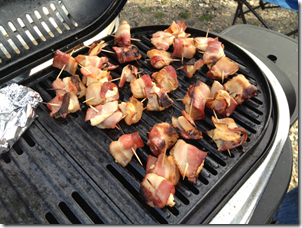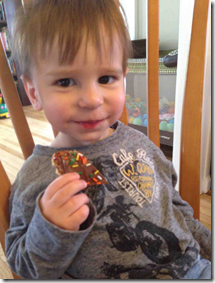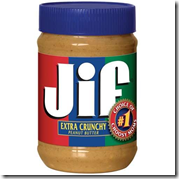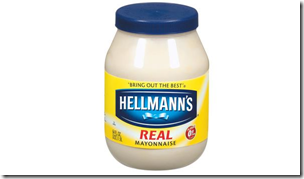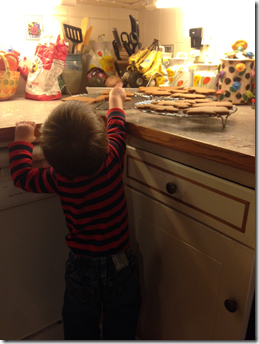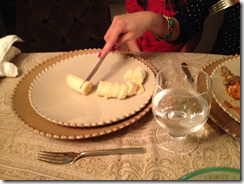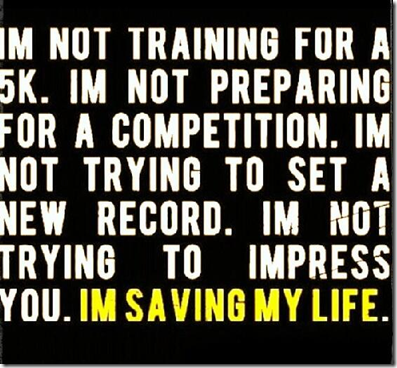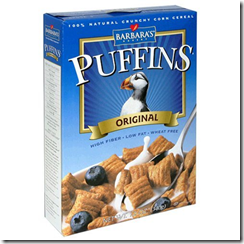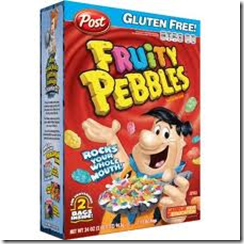My daughter is a lot like me. She possesses a distinct and often divergent point of view, and she cares little for what others may think of it. When everyone is sitting, she stands. When everyone is singing, she is silent. She does things her own way, in her own time. Conformity is not her concern.
She owns a shirt with the image of a dog on the front, but she wears it backwards because she doesn’t “want to have to look at that dog all day."
Thankfully, she also possesses an uncommon level of sweetness that allows her to be compliant to authority figures when necessary.
I’m hoping that this will always be the case, but if my genes win out, it won’t.
Speaking from experience, it will be critical for my daughter to find the right spouse someday. Some people are harder to be married to than others. I’m not always the easiest, and I think my daughter will be the same way.
Case in point:
On Friday night Elysha and I went to dinner at Peppercorn’s Grill in Hartford before I was to take the stage at the Mark Twain House to tell a story.
As the hostess seated us, she leaned in close to me and whispered, “I’m going to have to ask you to remove your hat.”
I was dressed as I normally am for a storytelling event: jeans, a shirt, a good pair of shoes and a baseball cap. The lighting at many of these events is pointed almost directly into the storyteller’s eyes, so a cap with a brim helps to diffuse the glare and allows me see my audience better.
Needless to say, I was angered by the request. While it’s entirely within the restaurant’s rights to impose a dress code, I found the arbitrary nature of the request insulting and ridiculous.
I also become unreasonably annoyed and petulant when anyone tells me what to wear. It’s #10 on my list of shortcomings and flaws.
Did my hat somehow detract from the experience of my fellow diners?
Did it harm the reputation or image of the establishment?
Did it threaten profits?
Snobbery and pretention. That is why I was asked to remove my hat. Management had deemed hat-wearing patrons unworthy of their establishment’s fine reputation. I was being asked to conform to their snobbish standards.
I despise snobbery. I abhor pretention. But I hate conformity most of all.
My first reaction was to turn around and leave, but we only had about an hour before the show, and we were using a Groupon. If we didn’t use it, we would lose it.
My second thought was to refuse to remove the hat and see what happened. Again, the limited amount of time I had to eat, coupled with the potential loss of the Groupon, prevented me from taking this course of action, though I seriously considered it for a moment.
Elysha also loves this restaurant. We celebrated our anniversary at this restaurant back in July. The food is great. The parking is free. The wait staff is extraordinary. Even though she was almost as annoyed about the request as me, I wasn’t going to spoil her evening.
This represents significant growth, by the way. Ten years ago, I would’ve spoiled the evening. I’m a much better person today.
But I couldn’t let it go, either. I couldn’t allow this ridiculous request to remain unchallenged in some way. After we ordered dinner, I proposed a plan:
We would return to this restaurant in the near future. In lieu of a hat, I would wear my oldest, most ill-fitting concert tee-shirt from the 1980s. Motley Crüe, perhaps. Better yet, Skid Row.

Add to this a pair of ripped jeans and my rattiest pair of sneakers.
If the restaurant is so concerned about their image, they’ll have no choice but to turn me away. If a simple baseball cap is unacceptable, a man dressed in the ancient, torn, ill-fitting clothing of a heavy metal fan from 25 years ago can’t be deemed acceptable.
Right?
Or was it simply an aversion to hats that the restaurateur suffers, and if so, what if a woman wore a hat to dinner? Would she be asked to remove it as well?
What if I had been an 80 year-old man wearing a fedora? Would I have received the same treatment?
What if I had wrapped a bandana around my head? Would I be asked to remove my bandana as well?
What if I had been one of the many film or television stars who make their home in Connecticut? Kevin Bacon? Paul Giamatti? Michael J. Fox? Paul Newman? Would I still have been asked to remove my hat?
Elysha and I spoke about all of this as we waited for our meal, but here’s the thing. The most important thing:
Elysha supports the plan. She agreed without hesitation. She would never do such a thing (even though she thinks their hat policy is rude and arbitrary as well), but she has no qualms about me being me. She’s willing to go along to see what happens. I think she may even be looking forward to it.
Perhaps a majority of spouses would feel the same way, but I don’t think so. I suspect that many would veto the plan entirely or at least attempt to talk their spouse out of it. Others might tell their spouse to execute the plan without them.
I don’t think there are many who would’ve instantly, happily agreed as Elysha did.
And it’s not because Elysha thinks this is a great idea. In a perfect world, I think she would prefer that I simply avoid wearing a hat whenever we dine at Peppercorn’s Grill, but she also knows that as silly as this may seem, it’s important to me.
Above all else, my wife wants me to be me, and she wants this without reservation, hesitation or uncertainty.
It is why I feel like the luckiest spouse on the face of the Earth. How rare it is to find someone who not only accepts but embraces you for being you.
This is what I hope my daughter can find someday, too. If my suspicions are correct, she, too, will not be the easiest person to marry. She will likely possess certain ideas and beliefs that run counter to the thoughts and actions of the majority. She will do things her own way, in her own time, regardless of what others may think. She will need to find someone who can accept and embrace this about her, as Elysha has done for me.
Not someone simply willing to accept the Skid Row tee-shirt, but someone willing to support it without reservation.
I just hope there are more people like Elysha in the world, because based upon what I see and hear, she seems like a very precious commodity.
